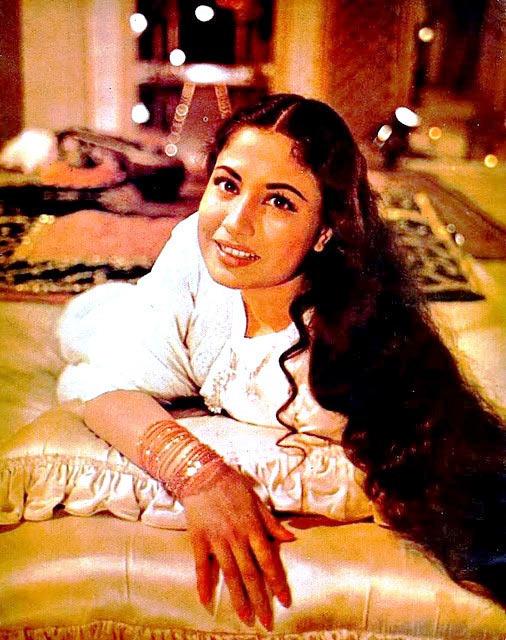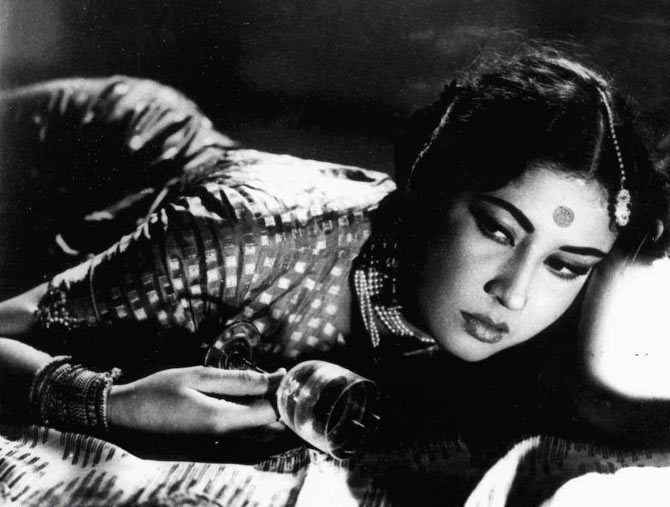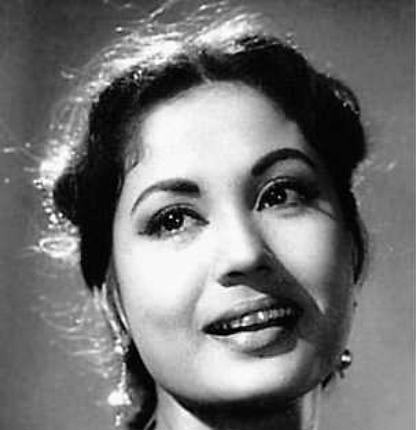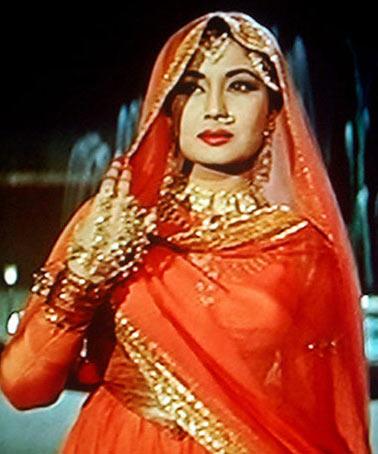Vinod Mehta's illuminating 1970s biography, Meena Kumari: The Classic Biography, which has been reissued recently, answer many myths and mysteries that surround the star's life and death.
Exclusive excerpts from the book:
It is difficult to fix the exact date when my heroine took to drink.
Always a creature of the night, she was a veritable owl -- the difference being that she did not sleep in the day either -- who since the days of her telephone romance had found difficulty in closing her eyes.
Dr Saeed Timurza, her physician, then prescribed a peg of brandy as a sleeping pill, and this was officially how she came into contact with the habit that was to kill her.
If she took to drink initially it was because she was exhausted. (According to Kamal Amrohi, the one peg of brandy increased to many more. One day he apprehended Meena's maidservant pouring out the doctor's medicine and he noticed the glass was nearly half full. On reprimanding the maidservant he discovered that this measure had become my heroine's standard, and further, the bottles of Dettol in the Amrohi bathroom did not contain antiseptic but brandy. From that day onwards Kamal says he checked the Dettol bottles and ensured that Meena did not have any drink handy.)
Excerpted from Meena Kumari - The Classic Biography by Vinod Mehta, HarperCollins India, with the author's permission, Rs 350.
Squabbles, arguments, bad feeling, drink -- and then physical violence
Image: Meena Kumari in Sahib Bibi Aur GhulamHowever devoted one may be to one's vocation, there is a physical limit, and Meena was working so remorselessly that I am surprised she did not have a physical breakdown.
In the year 1962-1963 she had sixteen contracts on hand and she confessed, 'Every morning as I leave the house for the studios a weariness fills me. I say to myself, "Let this be the last ride. Let me come back in the evening, pack up my things and go for a long holiday."'
I wish she had.
Instead, she continued working like a Trojan while things at Rembrandt deteriorated still further.
Squabbles, arguments, bad feeling, drink -- and now physical violence.
Unexpectedly, it all began on the auspicious day of Eid.
On that night Meena's feelings for her husband were such that she grabbed his chikan kurta by the neck and ripped it. Amrohi says that he too lost his temper and for the first time, as he puts it, 'lifted his hand'.
Allow me to digress a little.
The life of a popular film star is such that it demands at all times a composed public face. Since a film star is the property of the public, he must, whatever his private circumstances, maintain his social obligations.
To her fans, therefore, it was of no consequence whether Meena Kumari was having boxing bouts with her husband or whether she was drinking brandy out of Dettol bottles or whether she desperately wanted a respite from the camera.
No, for them she was the ace actress of India and her behind-the-screen tribulations had no admirers.
Brandy was her drink and she drank it neat
Image: Meena Kumari in TamashaThe odd peg of brandy, a minor habit from Rembrandt, increased voluminously; and it was nothing now for my heroine to go through a bottle or more a day.
Brandy was her drink and she drank it neat, without ice, without water; and she drank it when she felt like it -- which was most of the time. Invariably she sipped alone.
Dharmendra was almost a daily visitor at Janki Kutir. Together, they would open a bottle and spend a few hours. These were the good times.
Now there is an impression that Dharam (as she used to call him) was responsible for encouraging her towards the bottle. They say she drank because of him, because he insisted.
Like all good Punjabis, Dharam then and still enjoys his booze; but it is a lie that he persuaded or pressurized Meena to drink. Actually there was no need for that.
If anything he was unhappy about her drinking and tried to stop her. He nearly succeeded: while Dharam was around, Meena's imbibing was restricted, once he left it was rampant.
Work, however, did not stop.
In 1964, Birnal Roy's Benazir was released and so was Kidar Sharma's Chitralekha. Other releases included Ghazal, Main Ladki Hun, Sanjh Aur Savera. Alas, not one of these films including Bimal Roy's effort is worth analysis or consideration. All that this kind of cinema did for my heroine was keep her in the public eye.
Dharam was everything she wanted then
Image: Meena Kumari in PakeezahAgain, in the end of 1964, she was to know happiness briefly.
Dharam was everything she wanted then: Honest, reliable, large, loving and comforting.
She saw a lot of him at work and after work.
In 1964, my heroine was involved in five films and in four of these -- Purnima, Chandan Ka Palna, Phool Aur Patthar, Kaajal -- he was very much in the scenes.
And with great abandon did she love.
Meena, to her eternal credit, was an honourably honest woman when it came to the affairs of the heart; and since she truly loved this Punjabi youth she saw no reason either to be ashamed or to keep it a secret.
This honesty runs so contrary to the usual practice in the world Meena was employed that it not only deserves notice but also commendation. Her colleagues, like her, had lovers, but they drove in late at night, incognito, wearing dark glasses and hired rooms in hotels under false names.
They were ashamed of what they were doing.
Not my heroine, she was proud.
At cocktail parties, at premieres, Meena openly showered affection on Dharam. Sometimes she would take his hand and the next day it would be in print. On one occasion, mischievously almost, she recited a love couplet from Ghalib which left no doubt in the audience's mind about Mr Dharmendra's position in Meena's heart.
Dharam loved Meena Kumari, but he wasn't willing to sacrifice his marriage for this love
Image: Vinod Mehta's book, Meena Kumari: The Classic Biography, is a must-read.In 1964 and 1965, those in the business whose job it was to report rumour and gossip were not short of material.
Interestingly, on the screen the romantic association wasn’t immediately successful.
Purnima went away unnoticed, and Kaajal which was noticed had Dharmendra as second man, with Raaj Kumar taking the main honours.
Individually, Meena's performance in Kaajal was hailed and it was rumoured that this particular excellence would probably fetch my heroine another award.
It was only in early 1966 that the Dharam-Meena team established itself as a winner through OP Ralhan's Phool Aur Patthar.
The success of Phool Aur Patthar was based on a number of elements complementing each other: Good music, advanced photography, arresting titles (a taxi driver told me he had seen the film seven times because of the 'first class' beginning) judicious mixture of breast, bottom and cabaret, and, of course, flawless Meena Kumari acting coupled with a competent effort by Dharmendra.
All in all a shrewdly packaged commercial film. (Ralhan himself had no small part in his venture. He is one of the few natural comics we have, and it is a pity he has gone in for the megaphone instead of the laughs.)
My heroine had never paused to consider the long-term possibilities of her association with Dharam. Really she was not that kind of woman. For her what mattered was the present, and if she could snatch fleeting moments of happiness, it was enough.
In fact, if Meena had paused to consider she would have noticed many difficulties. Mr Dharmendra was a married man. He had a son and a simple homely Punjabi wife; and his allegiance to his family was absolute. Meena was aware of this. Dharam loved her but he wasn't willing to sacrifice his marriage for this love.
On her end, Meena was still officially Kamal Amrohi's wife, so she wasn't free either.
'To get married,' she told a friend in 1965, 'you need a "baaraat". We are both helpless.'






Comment
article